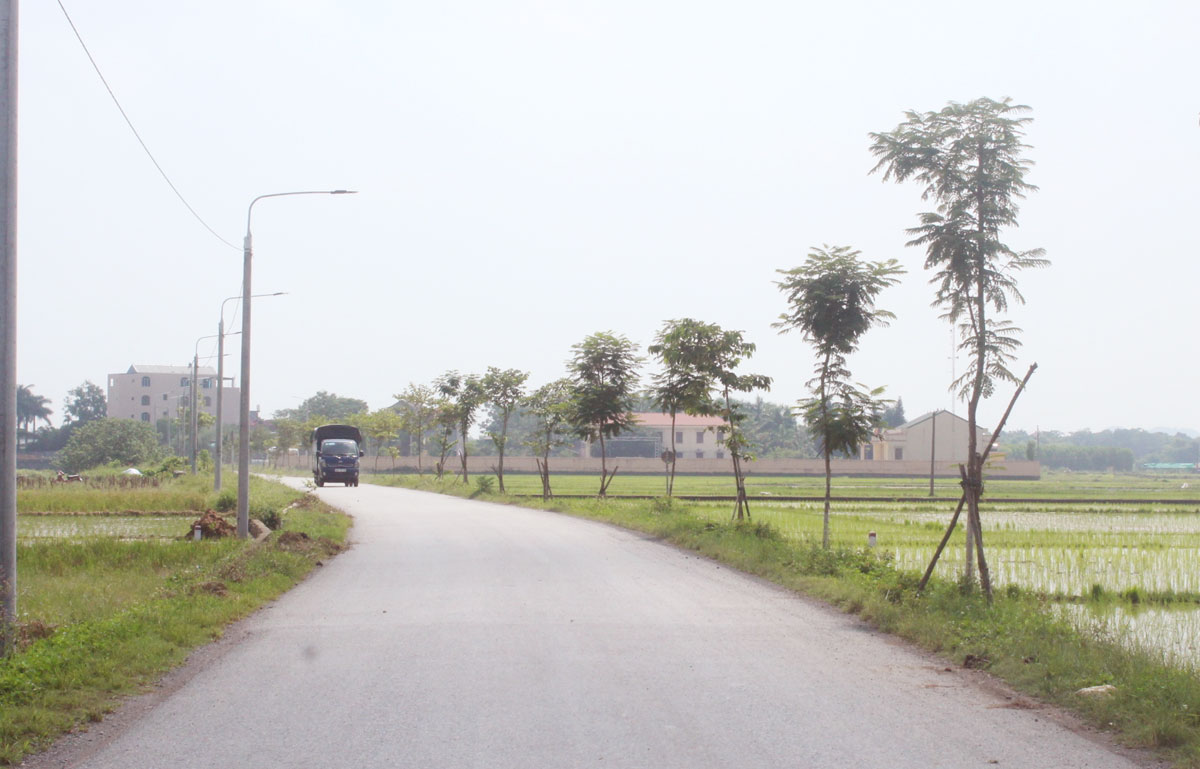
(HBO) – The national target programme on building new-style rural areas has received wide support from people in Hoa Binh province. A wide range of campaigns have been carried out to cast a new look to the locality while improving local livelihoods, including "Hoa Binh people join hands to build new-style rural areas”, "The whole people unite to build new-style rural areas and civilised urban areas”, and "Clean house-beautiful garden-pleasant environment-civilised alley”.
 Investment injected to enlarge roads in Tan Vinh commune,
Luong Son district, to meet travel and trade demand of locals.
Investment injected to enlarge roads in Tan Vinh commune,
Luong Son district, to meet travel and trade demand of locals.
During January-September, more than 1.9 trillion
VND (81.6 million USD) was splashed out to implement the new-style rural area
building programme. Of the total amount, more than 720 billion VND was sourced
from the central budget, 876.9 billion VND from local budget, and 54.14 billion
VND mobilised from enterprises and organisations. Particularly, some 175.8
billion VND worth of local people’s land, money and working days was raised for
the construction of public works.
Along with infrastructure, the province paid due
heed to developing production and better income for farmers. In the nine-month
period, Hoa Binh city and districts mobilised 13.1 trillion VND to branch out
production models and projects.
With the allocated 1.2 billion VND, Luong Son
district carried out a project to develop cattle herd, while Tan Lac district
used 953 million VND to develop local buffalo herd. Additionally, the
provincial Department of Agriculture and Rural Development implemented three
value chain projects with a total value of over 2 billion VND. The provincial
People’s Committee supported 12 value chain projects with over 16.6 billion
VND.
Thanks to concerted efforts of the locality, the
province has 57 communes meeting criteria of new-style rural areas, accounting
for 43.5 percent of the province’s total communes. Six communes satisfied 15-18
criteria, and 68 communes attained 10-14 criteria. The whole province completed
15.15 criteria on average.
Hoa Binh province is now home to seven communes
achieving advanced criteria for new-style rural area, 39 model residential
areas, and 122 model orchards./.
The Standing Board of the Hoa Binh provincial Party Committee has agreed in principle on a proposal by the Standing Board of the Party Committee of Hoa Binh city to gather feedback on the city’s 1:2000 zoning plan, which forms part of its broader urban development strategy.
Hoa Binh province has made notable progress in public administration reform and digital government development, with the satisfaction index among citizens and businesses reaching over 84%, according to recent government evaluations.
Thanks to great efforts by local authorities in recent times, the governance and public administration performance of Mai Chau district has been significantly improved.
In the afternoon of June 6, the Party Committee, the People's Council, the People's Committee and the Fatherland Front of Lac Son district solemnly held a meeting to celebrate the 139th anniversary of the district's founding (1886–2025) and the 79th anniversary of the establishment of the district's Party Committee (1946–2025). There was the attendance of Mr. Bui Van Thang, the Vice Chairman of the Provincial People's Council; Mr. Quach Tat Liem, the Vice Chairman of the Provincial People's Committee; Ms. Dang Bich Ngoc, the Deputy Head of the National Assembly Delegation of the province; as well as the former leaders of the province and district through various periods, who are the natives of the district.
Implementing the Politburo’s Resolution No. 57-NQ/TW on breakthroughs in science – technology, innovation, and digital transformation is a golden opportunity for the northern mountainous province of Hoa Binh to renew growth model, improve competitive edge and shorten digital gap.
Resolution 57-NQ/TW, issued by the Politburo on December 22, 2024, identifies sci-tech, innovation, and digital transformation as strategic breakthroughs to build a developed and prosperous nation. In Hoa Binh province, this spirit is not just a slogan, it’s being put into action through concrete initiatives that form a "new development triangle”: digital citizenship, digital economy, and digital administration.



 Investment injected to enlarge roads in Tan Vinh commune,
Luong Son district, to meet travel and trade demand of locals.
Investment injected to enlarge roads in Tan Vinh commune,
Luong Son district, to meet travel and trade demand of locals.